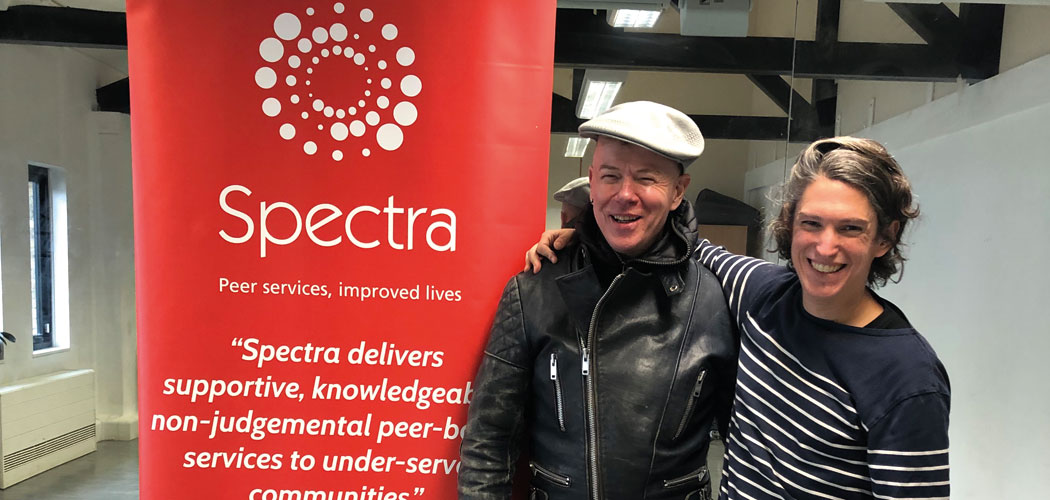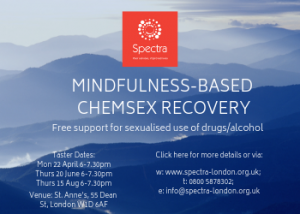Mindfulness-Based Chemsex Recovery (MBCR) is a new programme launching in May in Soho provided by peer health organisation, Spectra. We had a chat with Spectra’s mental health lead Ben Hoff, and outreach worker Bex Freeman who are developing and co-facilitating the programme to find out more.
Hi Ben and Bex, so what’s Mindfulness-Based Chemsex Recovery?
Mindfulness-Based Chemsex Recovery (MBCR) is an intensive recovery programme for men whose sexualised use of chems, alcohol and other substances is negatively impacting on their lives and want to exercise greater choice or stop using altogether. It’s based on the original Mindfulness-Based Relapse Prevention model and is funded by Public Health England’s HIV Innovation Fund. It’s open to gay/bisexual men (both cis and trans) and men who have sex with men.
Why has Spectra chosen to develop MBCR?
Ben: We wanted to address what has become a real and substantial problem in our community by developing a programme which reduces social isolation and whose benefits can be sustained by participants long after its conclusion. Mindfulness-based approaches (MBAs) have the advantage of being delivered in a supportive, group format and help participants develop a meditation practice that can support them for the rest of their lives. They also have an excellent evidence base. A 2017 research meta-analysis (W. Li et al.) found in virtually all studies MBAs were associated with superior substance misuse treatment outcomes, reducing craving and enhancing abstinence at follow-up compared to standard relapse prevention. We see MBCR as complementing other excellent high-intensity interventions offered by 56 Dean Street and Antidote.
What is mindfulness anyway?
Bex: Mindfulness is simply a quality of awareness that anchors us to the present moment, with openness, acceptance and curiosity. And we develop that attention through the practice of focussed attention in the form of meditation which can include breath awareness, body awareness, mindfulness movement and mindful compassion. We’re then able to carry that awareness through to our lives more generally.
Okay, I’m with you so far… but why practice it?
Ben: Well the human brain has evolved to help us survive as a species, but not to make us very happy. We do a lot on autopilot (breathing, walking, eating… sex even!) freeing up brain space to focus on other things but we miss a lot of life in the process. Our brain also has a deft ability to calculate threat. The downside is that a triggering event can cause us to spin stories about what might happen next, causing us unnecessary worry and anxiety. By interrupting our autopilot and anchoring us to the present, mindfulness helps us experience life more consciously and vividly. We then respond rather than react to life’s inevitable curveballs and stay with what’s happening now (rather than what might happen), reducing worry and anxiety.
How does this help with issues around chemsex?
Bex: Addictive or compulsive behaviours (and that’s usually what chemsex has become for somebody who’s seeking help) also operate on autopilot. I mean let’s face it, life can be tough and our community has experienced its fair share of pain and trauma. It can also be exhilarating. And much of the time fairly boring and unremarkable. We all have our ways of coping with this and sex, drugs and alcohol historically have been three of our favourites. When conscious choice dissolves into a habit, we feel compelled to satisfy our cravings at any cost and lose the ability to stop and ask ourselves: ‘Is this actually what I want or need in this moment?’. Mindful awareness helps us create a space to step back and choose what we do next, giving us back our power and freedom.
So who’s the course aimed at?
Bex: There’s no specific entry ‘criteria’ – we’ll consider every person individually. If we feel that a different form of support might be more suitable then we can discuss other options.
What if I don’t want to stop chems completely?
Ben: ‘Recovery’ can mean many things – total abstinence for some, reducing to recreational use for others. In mindfulness practice, we meet ourselves where we’re at. We do invite participants not to use for the six-week duration of the course so they can engage in the course more fully. But lapses happen, and that’s okay, it’s an opportunity to pause and ask ourselves: ‘And what do I want to do next?’.

How did you both come to train as mindfulness teachers?
Ben: I started practicing mindfulness during my mid-20s as a way of supporting myself through a very difficult period in my life. When I came through it, I decided to train as a teacher so I could share what I’d learned with other people. Beyond my role at Spectra, I now work as an Associate Mindfulness Trainer with Breathworks, delivering courses at the West London Buddhist Centre as well as in healthcare settings and the corporate world.
Bex: I have always had a strong hedonistic streak but also a deep motivation to look after my own health and wellbeing. Mindfulness approaches have helped me keep these in balance and have changed my relationship to myself in a way which is both more compassionate and more truthful. It seemed obvious to want to share these benefits so I did a postgraduate qualification in teaching Mindfulness-Based Approaches at the Centre for Mindfulness Research and Practice in Bangor.
Who are Spectra?
Ben: Spectra works to improve the choices, health and well-being of people like your readers. We work with all people, often from diverse and marginalised communities, empowering positive, informed choices about health, including sexual health, emotional resilience and wellbeing, and working to combat isolation and risk. We provide supportive, knowledgeable, non-judgemental services which are all peer led, meaning they are delivered by people from the communities we work with themselves.
How do people sign up and what can they expect?
Ben: A good place to start is coming to one of the taster events we’ll be holding this year so you can experience mindfulness for yourself. If you can’t make any of the tasters that’s also okay, you can still register for a place on one of the courses. The courses will take the form of four half-day Saturday retreats two weeks apart, with daily home practice, and an online session between retreats for people to check in with each other. Check our advert in Boyz this week for full details.
You can read more about Spectra’s services at spectra-london.org.uk















